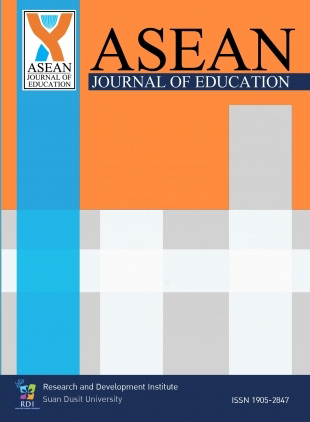University Students’ Perceptions on Assessing Levels of Intelligibility and Comprehensibility of the Pronunciation of Native English Teachers’ (NETs) as Compared to the Pronunciation of Non-native English Teachers’ (NNETs): A Case-Study with Freshmen Unde
Keywords:
Comprehensibility, Familiarity, Intelligibility, PerceptionsAbstract
At large, the following research study investigates the relationship between students’ levels of understanding (comprehension) of various English accents and their attitudes to their desired pronunciation models in the future. The following study established that from students’ perspectives, the accents of native English teachers (NETs) are both more intelligible and comprehensible than the accents of non-native English teachers (NNETs). This study also revealed that intelligibility and comprehensibility could indeed be looked at interchangeably and they both complement each other. The findings also strongly suggest that the majority of the participants expressed preference for native speaker (NS) accents and, in particular, American English (AE) accent(s) as their desired pronunciation models because of their high levels of familiarity with that particular accent. Yet, the findings suggest that students were mostly informed about two pronunciation models of English amongst all: AE and South Korean English (SKE). Thus, despite the fact that they expressed preference for NS accents versus non-native speaker (NNS) accents, they seemed to be in favour and/or aware of precisely AE and SKE accents the most again because of issues of familiarity. These findings thus reveal that to a large extent, learners of English are not aware of the many other varieties of English that are existent in the world, no matter whether they are NS accents or NNS accents. In light of this, a conclusion could be drawn from this particular study that the study of English and, especially the area of pronunciation, should be viewed through its pluralistic prism and students should be informed about the many varieties of English that exist in the world.
References
Ahn, S. Y., & Kang, H. S. (2017). South Korean university students’ perceptions of different English varieties and their contribution to the learning of English as a foreign language. Journal of Multilingual and Multicultural Development, 38(8), 712-725.
Ballard, L., Winke, P., Isaacs, T., & Trofimovich, P. (2017). Students’ attitudes towards English teachers’ accents: The interplay of accent familiarity, comprehensibility, intelligibility, perceived native speaker status, and acceptability as a teacher. Second language pronunciation assessment: Interdisciplinary perspectives, 121-140.
Charles, Q. (2015). Native Korean Speakers’ Attitudes Toward Konglish as a Standardized Variety of English. International Journal of Literature and Arts, 3(6), 136-141.
Jenkins, J. (2007). English as a lingua franca: Attitude and identity. Oxford: Oxford University Press. Kaur, P., & Raman, A. (2014). Exploring native speaker and non-native speaker accents: The English as a Lingua Franca perspective. Procedia-Social and Behavioral Sciences, 155, 253-259.
Kim, Y. S. (2007). Korean adults’ attitudes towards varieties of English. (Master’s Thesis). Retrieved July 1, 2019 from: https://core.ac.uk/download/pdf/277640.pdf
Kongkerd, W. (2013). Teaching English in the era of English used as a lingua franca in Thailand. Executive Journal, 33(4), 3-12.
Natiladdanon, K., & Thanavisuth, C. (2014). Attitudes, Awareness, and Comprehensibility of ASEAN English Accents. HUMAN BEHAVIOR, DEVELOPMENT and SOCIETY, 9(1), 16-30.
Phillipson, R. (1992). Linguistic imperialism. Oxford: Oxford University Press.
Pickering, L. (2006). Current research on intelligibility in English as a lingua franca. Annual Review of Applied Linguistics, 26, 219-233.
Shim, J. H., & Choe, H. (2017). Korean TESOL Graduate Students' Attitudes Toward Korean English. International Information Institute (Tokyo). Information, 20(3B), 1859-1872.
Smith, L. E., & Nelson, C. L. (1985). International intelligibility of English: Directions and resources. World Englishes, 4(3), 333-342.
Smith, L. E. (1992). Spread of English and Issues of Intelligibility. In Kachru, B. (Ed.), The Other Tongue: English cross cultures. Urbana, IL: University of Illinois Press.
Smith, L. E. (2009). Dimensions of understanding in cross-cultural communication. In Murata, K., & Jenkins, J. (Eds.), Global Englishes in Asian contexts: current and future debates. New York: Palgrave Macmillan.
Todd, R. W. (2006). The myth of the native speaker as a model of English proficiency. Reflections, 8, 1-7.
White, A. R., Treenate, D., Kiatgungwalgrai, A., Somnuk, R., & Chaloemchatvarakorn, K. (2016). The Effects of Accent Familiarity on English as a Foreign Language Students’ Word Recognition and Comprehension of the English Language. UTK RESEARCH JOURNAL, 10(2), 21-30.
Downloads
Published
How to Cite
Issue
Section
License

This work is licensed under a Creative Commons Attribution-NonCommercial-NoDerivatives 4.0 International License.
1 All articles will undergo a formal peer-review. A panel of experts from within or without the university will examine the article; approval from a minimum of two experts is required for publication. Revisions posed by the experts must be completed by the research prior to publication.
2 Once published in the ASEAN Journal of Education, the article becomes intellectual property of Suan Dusit University. Duplication, in full or part, requires permission from Suan Dusit University.
3 Excluding errors incurred during printing, author(s) are responsible for the content of their articles.






